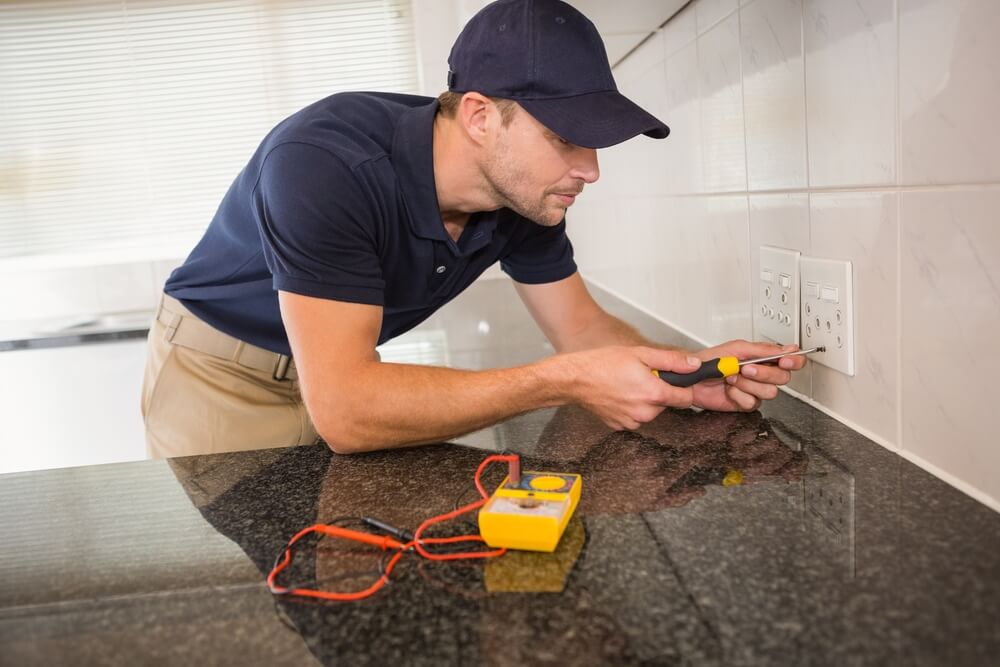There are electrical regulations that require you to arrange an inspection and electrical safety certificate for all your private rented properties.
As a landlord, you’ll need to make sure you’re complying with these rules. If you don’t you could face a fine of up to £30,000.
Read on to find out what you need to do, how much the checks cost, and how often they need to be completed.
Electrical testing for landlords
In July 2020, new electrical testing regulations for landlords were introduced for new tenancies in England. These changes, designed to improve tenant safety, were extended to existing tenancies from 1 April 2021.
You can read the full regulations on the government website.
There are similar regulations in other parts of the UK, with rules introduced in Scotland in 2015, and in Wales during 2022.
Meanwhile, electrical safety rules for private rented properties in Northern Ireland are set to be brought in line with the rest of the UK as part of the Private Tenancies Act (Northern Ireland).
What is the landlord’s electrical safety certificate?
Electrical testing requirements for landlords mean that you must test your property every five years. You’ll need to get an electrical certificate in the form of a written report – this is usually an Electrical Installation Condition Report (EICR).
A new safety report doesn’t need to be carried out every time a tenant moves out. However, a landlord must supply new tenants with a copy of the current EICR at the beginning of their tenancy.
What is an Electrical Installation Condition Report?
An EICR is a report completed by a qualified electrician after testing the electrical safety of a property.
The report will outline whether the electrical installations are dangerous, with the potential to cause fire risks or electric shocks.
To complete an EICR report, the electrician will inspect the property, checking for things like signs of overheating or damage to installations.
The final report will recommend any remedial work that needs doing to make the property safe or whether further investigation is needed.
How much does an EICR certificate cost?
The cost of getting your electrical certificate depends on a number of factors, including:
- the size of your home
- how many appliances you have
- the day rate of the electrician you use
What are the new regulations?
These regulations involve inspection and testing for all properties in the private rented sector. There are three key elements you need to be aware of:
1. Inspection every five years
A key feature of the ruling is inspection. Landlords will need to make sure all electrical installations in their property are inspected and tested by a qualified person every five years (at least).
You’re legally obliged to supply a copy of the inspection and test report to new, existing, and prospective tenants, as well as your local authority if they ask for it. Here are the timescales you’ll need to work to:
- existing tenants: within 28 days of the inspection and test
- new tenants: before they occupy the premises
- prospective tenants: within 28 days of receiving a request
- local authority: within seven days of receiving a request
The report should set a date for your next inspection and test, and you’ll need to keep a copy for the next inspector.
2. Meet the national standards
The national standards for electrical safety are set out in the 18th edition of the ‘Wiring Regulations’. You can find these on gov.uk, and may need to talk them through with a qualified electrician.
3. Do any remedial or investigative work
Any remedial work required in your report needs to be completed within 28 days of the test report (or a shorter time period, if specified). Your electrician will need to give written confirmation that they’ve completed this work for you, to the tenant, and local authority, within 28 days of finishing the job.
Which tenancies do the regulations cover?
Existing tenancies have had to comply from 1 April 2021, while all new tenancies have already been under this legislation since 1 July 2020. This will usually include assured shorthold tenancies, licences to occupy, and certain Houses of Multiple Occupation (HMOs).
There are exceptions, including:
- social housing tenants
- lodgers
- long leases of seven years or more
- student halls of residence
- hostels and refuges
- care homes
- specific healthcare accommodation
All of these will carry their own regulations, though, so read up on the different types of tenancy and make sure you’re meeting them.
What do landlords need to do?
Aside from the regulations outlined above, you’ll need to make sure your inspection and testing are booked in, and your installations are safe.
Find someone to carry out your test
They’ll need to be ‘qualified and competent’, and you’ll need to get the test repeated every five years. Use gov.uk for guidance on how to find a qualified person.
Prepare your property
Ahead of the test, make sure you’re clear on where all the relevant installations are, if possible. These will include:
- your fixed electrical parts (such as wiring)
- socket outlets (or plug sockets)
- light fittings
- consumer unit (or fuse box)
- permanently connected equipment like showers and extractors
Tenants are responsible for making sure their own appliances are safe.
Do you have any unanswered questions about electrical safety regulations? Let us know in the comments.
Useful guides for buy-to-let landlords
- Is there an air source heat pump grant for landlords?
- Is now a good time to buy a house?
- Help with rent arrears – a guide for landlords
- What does landlord insurance cover?
Get set with tailored landlord cover
Over 200,000 UK landlord policies, a 9/10 customer rating and claims handled by an award-winning team. Looking to switch or start a new policy? Run a quick landlord insurance quote today.

This block is configured using JavaScript. A preview is not available in the editor.